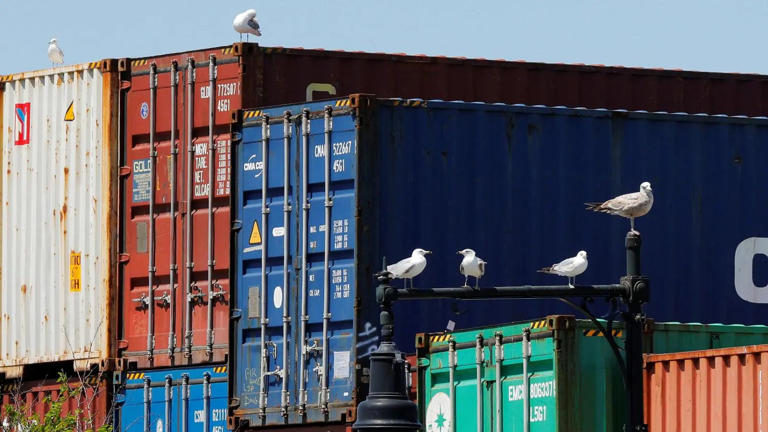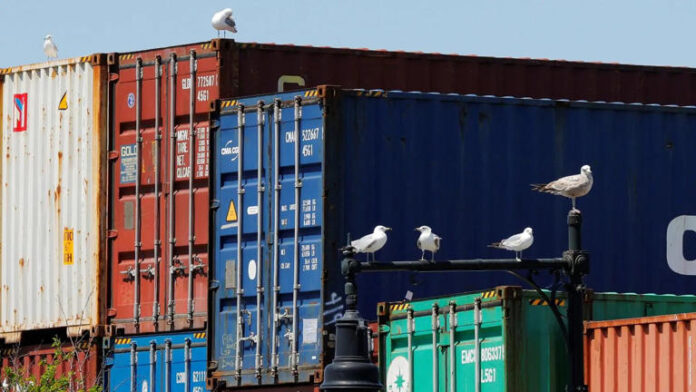The recently concluded Free Trade Agreement (FTA) between India and the United Kingdom, hailed as a significant milestone in bilateral relations, has encountered a potential stumbling block. The UK’s proposed Carbon Border Adjustment Mechanism (CBAM), set to be implemented in 2027, was notably excluded from the FTA, raising concerns about future tariff risks for Indian exporters.

TRADE –Understanding the Carbon Border Adjustment Mechanism (CBAM)
The UK’s CBAM would charge a carbon price on foreign imports to avoid “carbon leakage,” where firms could shift production to countries with softer environmental rules. The scheme is meant to put foreign producers who follow strict emission standards on an equal footing. The CBAM will first address high-emitting industries like iron and steel, aluminium, cement, ceramics, fertilisers, hydrogen, and glass.
Importers, meanwhile, will have to buy up emissions allowances that are equivalent to the carbon in their products, in order to equate import prices with domestic carbon prices. It is a step in the UK’s overall program to reach its climate objectives and spur world-wide emission cuts.
Implications for Indian Exports
India’s exports to the UK, especially in the concerned sectors, would suffer real challenges from the CBAM. The Global Trade Research Initiative (GTRI) estimates that Indian exports of around \$775 million would be affected by the UK’s carbon tax from 2027. The added expenses caused by the CBAM could undermine the competitiveness of Indian products in the UK market and negate the benefits attained from the FTA.
Ajay Srivastava, GTRI Co-Founder, highlighted the severity of the tax, which could be 14% to 24% of the import price, based on the carbon footprint of the goods. This is a major risk for Indian exports to the UK, where their products might not be as attractive with higher prices.
India’s Response and Concerns
Exclusion of the CBAM in the FTA has led India to reserve its right to retaliate or modify concessions if the carbon tax negatively impacts its exports. According to an Indian official, without explicit provisions to mitigate the impact of the CBAM, India has retained the right to rebalance concessions granted under the FTA. India is concerned that the CBAM can render the trade pact useless.(The Economic Times)
India has also made a “rebalancing mechanism” proposal in the FTA’s general exceptions chapter. This mechanism would enable India to seek compensation for losses suffered as a result of the CBAM and prevent the UK from bringing a complaint against India at the World Trade Organization (WTO). The proposal reflects India’s measures to protect its trade interests without deviating from international trade norms.
Challenges in Harmonizing Carbon Standards
One of the greatest challenges in solving the CBAM problem is that India and the UK have different carbon pricing mechanisms. India uses an emission intensity-based Carbon Credit Trading Scheme (CCTS) that is apt for a developing country’s framework. The UK’s framework, however, handles absolute emissions, which are hard to harmonize and recognize each other’s carbon prices.(The Indian Express)
This gap makes it difficult to exempt Indian exports from CBAM or to harmonize the two nations’ carbon pricing regimes. In the absence of mutual recognition of carbon standards, Indian exporters might still incur extra costs from the UK’s CBAM despite the tariff concessions from the FTA.
Wider Implications for Trade and Climate Policy
The CBAM question brings into sharp focus the dilemma of reconciling climate policy with international trade agreements. While the FTA seeks to strengthen trade ties and economic partnership, the CBAM adds a new aspect which has the potential to stretch these relationships. India has to balance the fine line between encouraging exports as well as fulfilling global climate obligations.(The Indian Express)
The case also highlights the importance of developing nations taking an active role in influencing global mechanisms of carbon pricing. By being part of international forums and negotiations, nations such as India can press for equitable and just treatment under climate trade policies.
Conclusion
Exclusion of the UK’s CBAM from the India-UK FTA is a major hurdle for Indian exporters. As the UK goes ahead with the rollout of its carbon tax, India will have to keep negotiating to defend its trade interests. Building a common understanding regarding carbon pricing mechanisms and obtaining exemptions or compensatory arrangements will be important in ensuring the FTA achieves its desired goals without unintended side effects.(The Economic Times)
The changing dynamics of climate and trade policy require cooperation, where the two nations have to move in unison to address environmental issues alongside economic development. Through harmonized approaches and acknowledgment of each other’s developmental environments, India and the UK can create room for a more sustainable and equitable trade partnership.

